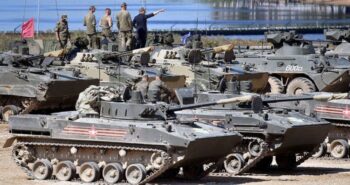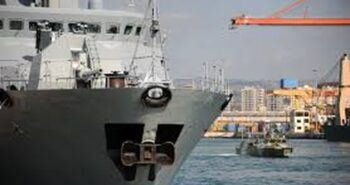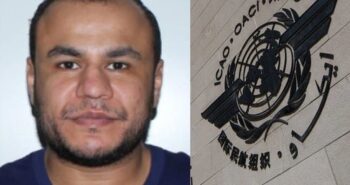
Libyans welcome UN-backed agreement but express scepticism about the implementation of it.
Libyans have reacted with a mix of hope and doubts after the signing of a nationwide ceasefire deal intended to pave the way towards a political solution to the country’s conflict.
While observers have welcomed the United Nations-backed deal, few are under any illusions about the difficulties of turning it into lasting peace on the ground.
“We’ve seen a lot of deals in the past,” said Hassan Mahmud al-Obeydi, a 40-year-old secondary school teacher from the eastern city of Benghazi. “What’s important is the implementation.”
Friday’s deal was signed in Geneva by military delegates from the two main warring parties in the North African country, which plunged into violence in 2011 with the NATO-backed revolt that toppled former leader Muammar Gaddafi.
The Tripoli-based Government of National Accord (GNA) and rival forces led by renegade military commander Khalifa Haftar agreed to withdraw from the front lines, start demobilising armed groups and set about integrating them into the state.
Crucially, the deal also calls for the departure of all foreign forces from Libyan soil within three months.
“It’s good that the two sides have been prepared to compromise, but the devil is in the detail,” said Peter Millett, a former British ambassador to Libya. “There are an awful lot of questions. A key one is – will countries that have been sponsors of military forces in Libya support this compromise?”
Both camps in Libya’s complex war have received extensive backing from foreign powers.
Friday’s deal comes four months after Haftar’s Russian- and Emirati-backed forces gave up their yearlong attempt to seize the capital, Tripoli, a battle that killed hundreds of people and displaced tens of thousands.
In June, Haftar withdrew from western Libya in the face of a blistering counterattack by forces supporting the GNA which is backed by Turkey.
The battle had further deepened the bitter mistrust between the rival political camps and their military allies, as well as common Libyans.
“The war caused terrible social divisions,” said Obeydi. “Work is needed immediately, right now, to rebuild and to heal the deep wounds in Libyan society.”
“We have experience with a previous agreement, which was five days before Haftar’s attack on Tripoli, during which he destroyed the capital’s infrastructure and killed many people,” pro-GNA fighter Salim Atouch said, voicing doubts the ceasefire would hold.
“I hope this won’t be like previous agreements, meaning we go back to war again. We will abide by it, but we are ready to react at any moment if it’s violated.”
The Geneva talks were the military part of a process led by the UN’s Libya mission UNSMIL.
Separate political talks that start on Monday aim to create a new governing body and prepare for elections.
Mohamed Dorda, co-founder and consulting director of geopolitical risk consultancy Libya Desk, said the ceasefire was a positive step that “creates a basis for the political talks”.
“Libya needs a security arrangement to allow a government to be set up. If we don’t deal with the security crisis, we will find ourselves in same situation in a few years.”
Massoud al-Fotmani, a 57-year-old from Benghazi who runs a group of food stores, said he hoped the ceasefire would hold.
“The war has caused a terrible economic downturn,” he said. “We’ve lost a lot of money because of the cutting of commercial ties between east and west due to the roads being closed.”
English teacher Mayssoon Khalifa, who works at a private school in Tripoli, echoed his call for lasting peace.
“Many are hopeful, but not optimistic,” she said. “I sincerely wish that this deal will hold. Libya deserves better.”
What does Libya’s ceasefire deal contain?
As Libya’s warring factions sign a permanent ceasefire, we take a look at the key details.
Libya’s warring sides signed an agreement for a permanent ceasefire on Friday in Geneva, representing a step forward in diplomatic efforts to resolve the conflict, though there is scepticism over whether the truce will last.
This is what they agreed to:
Who is involved?
Libya is split between the internationally recognised Government of National Accord (GNA) in Tripoli in the west and Khalifa Haftar’s self-styled Libyan National Army (LNA) in the east.
The latest United Nations meetings in Switzerland were between five military officers from each side representing the GNA and LNA after they held preliminary talks in Egypt this month.
UN acting Libya envoy Stephanie Williams said they had agreed to a complete, countrywide, permanent ceasefire with immediate effect.
The truce does not include UN-designated “terrorist” groups such as ISIL (ISIS), which is present in parts of the south.
What must both sides do?
All military units and armed groups must pull back from the front lines and return to their camps. All foreign fighters and mercenaries must leave Libya within three months – by January 23.
Williams said there were mercenaries from up to nine countries fighting in Libya. Both the GNA, backed by Turkey, and the LNA, backed by Russia, the United Arab Emirates and Egypt, have fielded foreign combatants.
Any military agreements either side has struck with their foreign backers must also be suspended until a new unified government is in place, the deal said, with all foreign military trainers to depart.
How will it be implemented?
The two sides will set up a joint military committee to form an operations room commanding a limited force of regular personnel.
It will identify and categorise all Libya’s many armed groups with UN help and work out whether, and how, to integrate their fighters into state institutions.
A new joint police operations room would secure areas from which the two sides’ military forces have withdrawn.
Both sides will work with the UN Libya mission to set up a way to monitor the truce and they have asked the UN Security Council for a resolution to ensure compliance.
What happens next?
The two sides must continue with agreed measures to build confidence, including the opening of land and air routes between areas they control, curbing hate speech, exchanging detainees and restructuring a security force for oil facilities.
The two military delegations that struck the deal will reconvene soon with subcommittees to work out details on tough questions, including the withdrawal from front lines, the departure of mercenaries and the unification of armed forces.
A round of political talks is expected early next month in Tunis.
How the world reacted to Libya ceasefire deal
The two main warring parties in Libya have signed a ceasefire agreement in Geneva, the UN says.
The two warring sides in Libya have signed an agreement for “a permanent ceasefire in all areas of Libya”, the United Nations Libya mission said in a Facebook post, showing live video of the ceremony to sign the agreement.
After mediation this week led by UN envoy for Libya, the 5+5 Joint Military Commission reached what the UN called a “historic achievement” and an “important turning point towards peace and stability in Libya”.
Libya has been racked by violence since a NATO-backed uprising in 2011 overthrew and killed veteran leader Muammar Gaddafi.
The North African country has been dominated by armed groups, driven by local conflicts, and divided between two bitterly opposed administrations: the UN-recognised Government of National Accord (GNA), headed by Prime Minister Fayez al-Serraj, and a rival administration in the east affiliated with renegade military commander Khalifa Haftar.
Here is how global bodies and leaders reacted to the ceasefire announcement:
United Nations
United Nations Secretary-General Antonio Guterres welcomed the ceasefire. “This is a fundamental step toward peace and stability in Libya,” Guterres said.
“I welcome the signing of a ceasefire agreement by the Libyan parties in Geneva today under the auspices of the United Nations,” he added.
Stephanie Turco Williams, the UN’s envoy to the troubled petroleum-rich country, said it was “a moment that will go down in history”.
“You have met for the sake of Libya, for your people in order to take concrete steps to put an end to their suffering,” she said at the signing ceremony.
“Nobody can love Libya as much as you do,” said Williams, who heads the UN Support Mission in Libya (UNSMIL).
European Union
The European Commission welcomed the declaration of a ceasefire in Libya and called for it to go into immediate effect and for peace talks to resume.
“The agreement of a permanent ceasefire is key for the resumption of a political dialogue,” EU foreign policy spokesman Peter Sano told reporters.
“It’s very important, as well, to see this accord put into effect.”
United States
The US hailed the ceasefire signed while also urged “internal and external actors to support the implementation of the agreement.”
“This agreement is a major step forward toward realising the shared interests of all Libyans in de-escalation, stability and the departure of foreign fighters,” said a statement issued by the US embassy in Libya.
“We urge internal and external actors now to support the good-faith implementation of the agreement.”
Turkey
Turkish President Recep Tayyip Erdogan questioned the viability of a permanent ceasefire signed between Libya’s two rival factions, one of which is supported by Ankara.
“Today’s ceasefire agreement was actually not made at the highest level, it was at a lower level. Time will tell whether it will last,” Erdogan, who backs the GNA, told reporters in Istanbul.
“So it seems to me that it lacks credibility,” he said.
Germany
Germany welcomed the ceasefire hailing the accord as a “ray of hope”.
“The ceasefire agreement finally promises a change of course from military to political logic,” Foreign Minister Heiko Maas said in a statement. “This news is the first ray of hope for the people of Libya in a long time.”
Greece
The Greek Ministry of Foreign Affairs called “on all parties to faithfully implement the agreement.”
Saudi Arabia
Saudi Arabia’s Foreign Ministry also welcomed the signing of the agreement.
“We express the Kingdom’s aspiration that the agreement will pave the way for the success of the political and economic negotiations,” the ministry said in a statement.
Norway
The Norwegian Ministry of Foreign Affairs said this was an “important step,” while it expressed its full “support … to create common ground between the parties.”
United Arab Emirates
The UAE on Saturday welcomed the agreement, a Foreign Ministry statement said.
It added that a political solution under UN supervision was the only way to end the conflict in Libya.
____________




